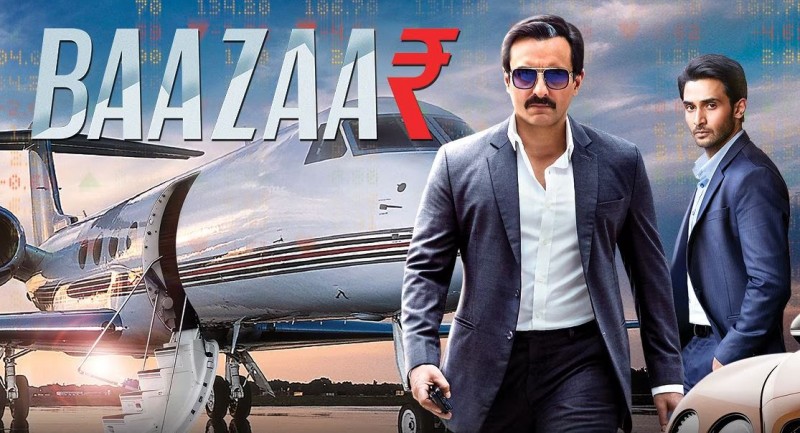
The trend of remakes and adaptations has frequently been seen in the world of film. Hollywood classics are a frequent source of inspiration for Bollywood in particular. An example of this is the 2018 Indian movie "Baazaar," which, despite not being acknowledged, has an uncanny resemblance to Oliver Stone's classic 1987 movie "Wall Street," starring Michael Douglas. This article examines the striking parallels between these two films and demonstrates how "Baazaar" can be seen as an unofficial remake of "Wall Street."
The high-stakes world of finance and the ruthless individuals who navigate it are at the centre of both "Baazaar" and "Wall Street." The main focus of "Wall Street" is the charismatic and dishonest corporate thief Gordon Gekko, played by Michael Douglas. Similar to this, "Baazaar" introduces us to Shakun Kothari, played by Saif Ali Khan, a cunning stockbroker with a propensity for market manipulation.
Both films follow the journey of a young, ambitious lead character who dreams of becoming successful in the competitive world of finance. Bud Fox, played by Charlie Sheen in "Wall Street," and Rizwan Ahmed, played by Rohan Mehra in "Baazaar," are the two main characters. At first, these characters are in awe of their respective mentors, Gekko and Kothari, who represent success to them.
The dynamic between a mentor and protege is a major theme in both movies. Bud Fox is taken under Gekko's wing and introduced to the world of corporate espionage and insider trading. Similar to this, Shakun Kothari teaches Rizwan Ahmed the nuances of the stock market, exposing the seedy side of the business. The mentorship in both films ultimately prompts consideration of what constitutes success in terms of morality and ethics.
The investigation of ethical conundrums in the finance industry is one of the crucial elements that link "Baazaar" to "Wall Street." Gordon Gekko famously says, "Greed is good," in the movie "Wall Street," summarising his unrelenting pursuit of material success at all costs. This phrase has come to represent the movie and the decade it depicts, which was marked by moral bankruptcy and corporate excess.
Similarly, "Baazaar" explores the subject of greed and ambition. Like Gekko, Shakun Kothari is motivated by an unquenchable desire for money and power. He acts with a similar disregard for morality and believes that ethics have no place in the stock market. The young lead of the movie, Rizwan Ahmed, struggles with the moral ramifications of the decisions he must make in order to succeed in this competitive environment.
The characters in "Baazaar" and "Wall Street" have a lot in common. Both Gordon Gekko and Shakun Kothari are charismatic and endearing individuals with a talent for stock market manipulation. The core of the stories in the movies is how ruthless they are and how much control they have over the young protagonists.
Two idealistic young men, Bud Fox and Rizwan Ahmed, struggle with choosing between their ambition and their moral compass. As they navigate the complex financial world, both characters go through a transformation, and their decisions determine the moral tenet of their respective movies.
The two films' settings are comparable in several ways. The late 1980s, a time of excess and financial deregulation, serve as the backdrop for "Wall Street" and are depicted as a chaotic New York Stock Exchange. In contrast, "Baazaar" is set in Mumbai's thriving financial district, where the stock market serves as the centre of influence and wealth.
Despite the differences in the settings, they both serve as representations of the teeming centre of the financial world, where fortunes are made and lost in the span of a single instant. A sense of urgency and intensity that permeates both films is brought on by the hectic trading floors and high-stress boardrooms.
"Baazaar" can be seen as an unofficial remake of Michael Douglas' "Wall Street" due to its striking plot similarities, examination of moral quandaries in the finance industry, similar character dynamics, and the evocative settings that resemble the world of high finance. Although "Baazaar" might not explicitly credit "Wall Street" as an influence, there are undeniable similarities between these two films.
The corrupting effects of ambition and greed in the financial world are depicted in both films as cautionary tales. They serve as a reminder that the pursuit of wealth at any expense can result in moral failure and personal ruin. The fact that "Baazaar" has a spiritual connection to "Wall Street" despite being a modern interpretation of these themes in an Indian context is proof that the original movie's message is still relevant today.
Sonam Kapoor's Mili Brings Magic to 'Khoobsurat' Remake
How 'Rehna Hai Tumhare Dil Mein' Rewrote the Rules of Film Promotion
Gurmeet Choudhary's Spectacular Debut in 'Khamoshiyan', A Journey to Stardom Begins